Economics and International Trade Report: Management Analysis
VerifiedAdded on 2020/05/28
|11
|2284
|74
Report
AI Summary
This report examines the application of management theories within the context of economics and international trade, using Vodafone as a case study. Part A presents a personal account of starting a fast-food business, analyzing the importance of planning, organization, leadership, and control (POLC) in overcoming initial challenges. Part B delves into the evolution of management thinking, focusing on scientific management and McGregor's Theory X and Theory Y. The report then analyzes Vodafone's management strategies, highlighting its adherence to scientific management principles, such as performance-based incentives and KPI reports, while evaluating the applicability of Theory X and Theory Y. The conclusion emphasizes the relevance of scientific management in modern organizations and the limitations of the other theories in the context of Vodafone's operations.
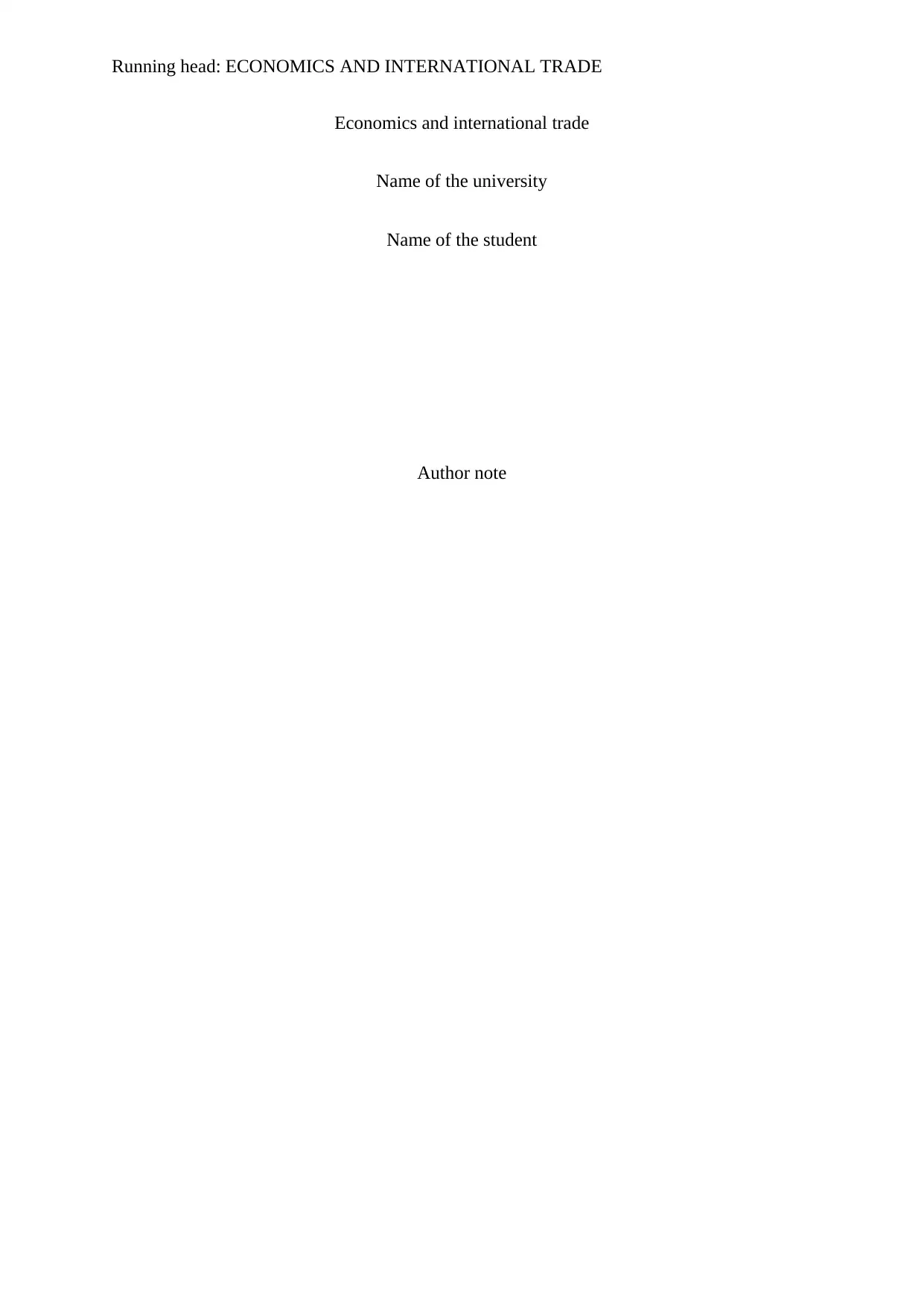
Running head: ECONOMICS AND INTERNATIONAL TRADE
Economics and international trade
Name of the university
Name of the student
Author note
Economics and international trade
Name of the university
Name of the student
Author note
Paraphrase This Document
Need a fresh take? Get an instant paraphrase of this document with our AI Paraphraser
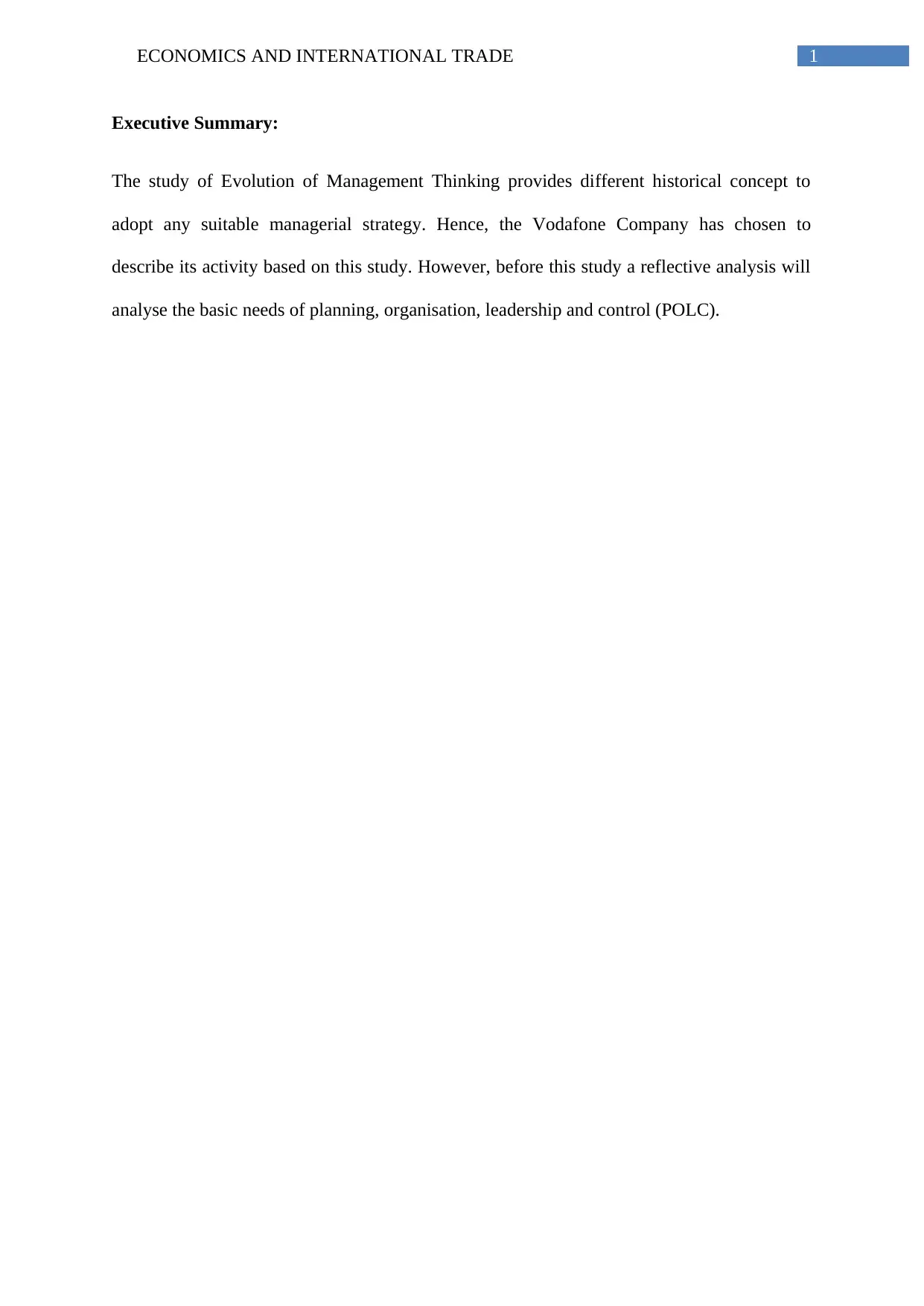
1ECONOMICS AND INTERNATIONAL TRADE
Executive Summary:
The study of Evolution of Management Thinking provides different historical concept to
adopt any suitable managerial strategy. Hence, the Vodafone Company has chosen to
describe its activity based on this study. However, before this study a reflective analysis will
analyse the basic needs of planning, organisation, leadership and control (POLC).
Executive Summary:
The study of Evolution of Management Thinking provides different historical concept to
adopt any suitable managerial strategy. Hence, the Vodafone Company has chosen to
describe its activity based on this study. However, before this study a reflective analysis will
analyse the basic needs of planning, organisation, leadership and control (POLC).
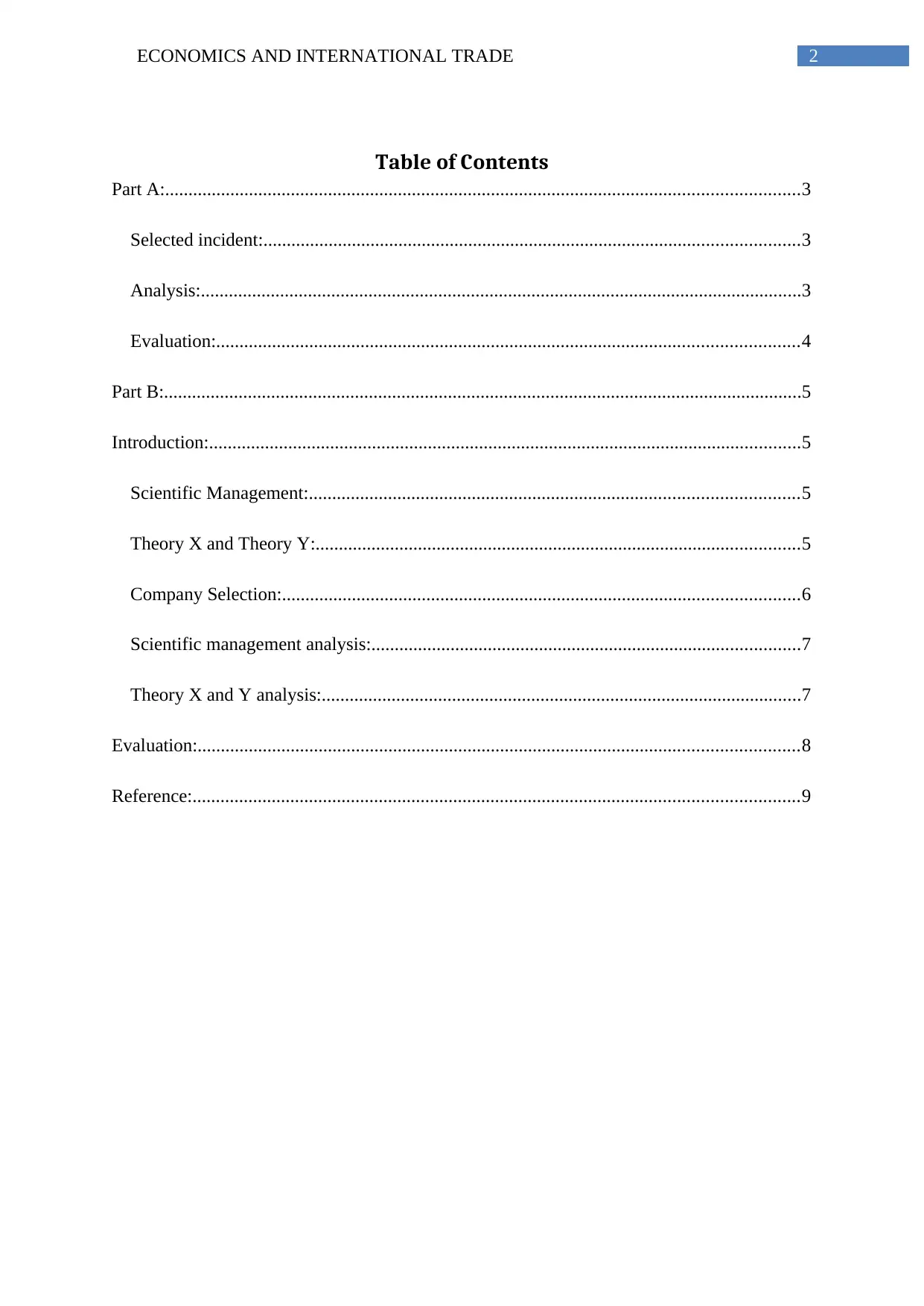
2ECONOMICS AND INTERNATIONAL TRADE
Table of Contents
Part A:........................................................................................................................................3
Selected incident:...................................................................................................................3
Analysis:.................................................................................................................................3
Evaluation:.............................................................................................................................4
Part B:.........................................................................................................................................5
Introduction:...............................................................................................................................5
Scientific Management:.........................................................................................................5
Theory X and Theory Y:........................................................................................................5
Company Selection:...............................................................................................................6
Scientific management analysis:............................................................................................7
Theory X and Y analysis:.......................................................................................................7
Evaluation:.................................................................................................................................8
Reference:..................................................................................................................................9
Table of Contents
Part A:........................................................................................................................................3
Selected incident:...................................................................................................................3
Analysis:.................................................................................................................................3
Evaluation:.............................................................................................................................4
Part B:.........................................................................................................................................5
Introduction:...............................................................................................................................5
Scientific Management:.........................................................................................................5
Theory X and Theory Y:........................................................................................................5
Company Selection:...............................................................................................................6
Scientific management analysis:............................................................................................7
Theory X and Y analysis:.......................................................................................................7
Evaluation:.................................................................................................................................8
Reference:..................................................................................................................................9
⊘ This is a preview!⊘
Do you want full access?
Subscribe today to unlock all pages.

Trusted by 1+ million students worldwide
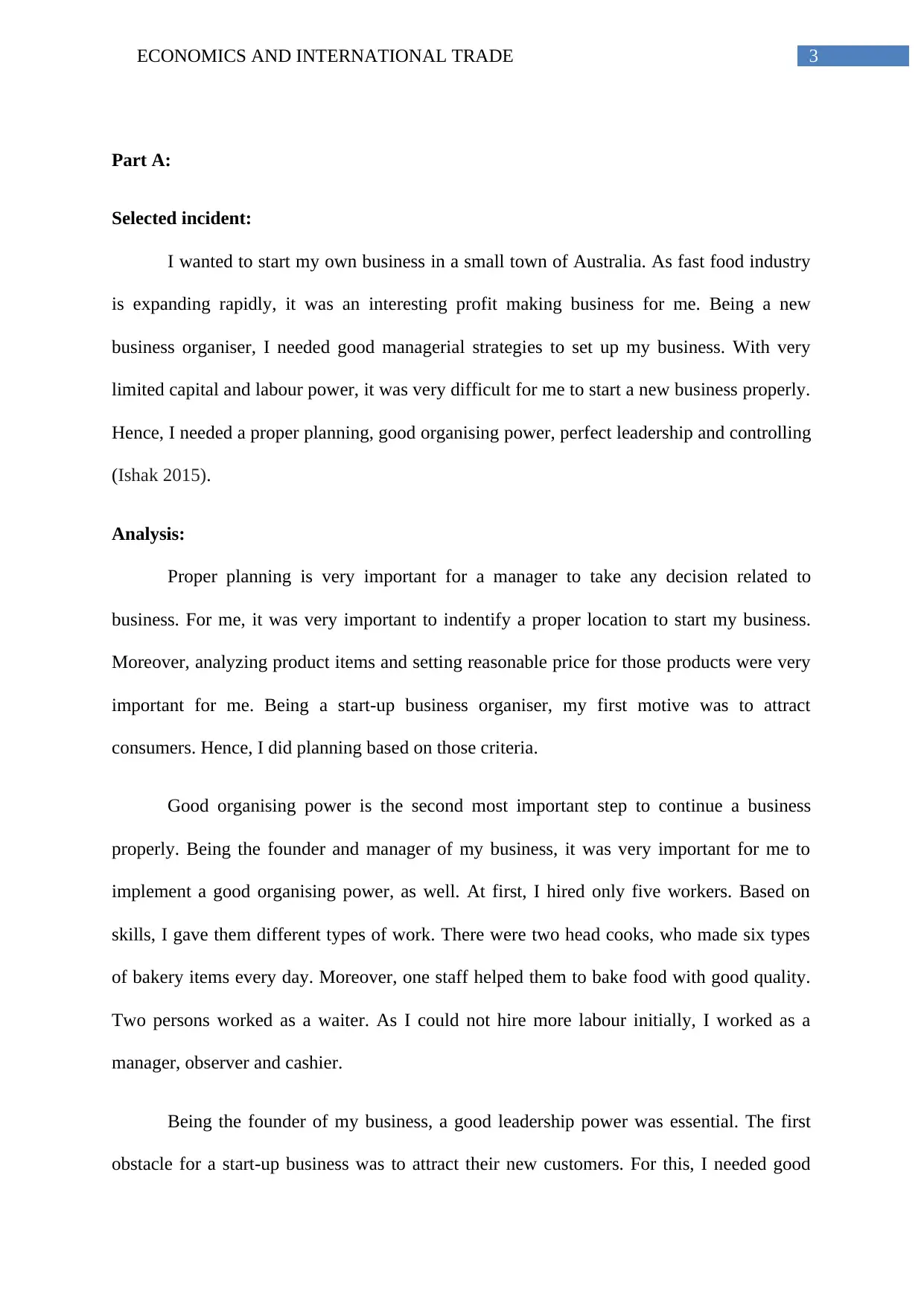
3ECONOMICS AND INTERNATIONAL TRADE
Part A:
Selected incident:
I wanted to start my own business in a small town of Australia. As fast food industry
is expanding rapidly, it was an interesting profit making business for me. Being a new
business organiser, I needed good managerial strategies to set up my business. With very
limited capital and labour power, it was very difficult for me to start a new business properly.
Hence, I needed a proper planning, good organising power, perfect leadership and controlling
(Ishak 2015).
Analysis:
Proper planning is very important for a manager to take any decision related to
business. For me, it was very important to indentify a proper location to start my business.
Moreover, analyzing product items and setting reasonable price for those products were very
important for me. Being a start-up business organiser, my first motive was to attract
consumers. Hence, I did planning based on those criteria.
Good organising power is the second most important step to continue a business
properly. Being the founder and manager of my business, it was very important for me to
implement a good organising power, as well. At first, I hired only five workers. Based on
skills, I gave them different types of work. There were two head cooks, who made six types
of bakery items every day. Moreover, one staff helped them to bake food with good quality.
Two persons worked as a waiter. As I could not hire more labour initially, I worked as a
manager, observer and cashier.
Being the founder of my business, a good leadership power was essential. The first
obstacle for a start-up business was to attract their new customers. For this, I needed good
Part A:
Selected incident:
I wanted to start my own business in a small town of Australia. As fast food industry
is expanding rapidly, it was an interesting profit making business for me. Being a new
business organiser, I needed good managerial strategies to set up my business. With very
limited capital and labour power, it was very difficult for me to start a new business properly.
Hence, I needed a proper planning, good organising power, perfect leadership and controlling
(Ishak 2015).
Analysis:
Proper planning is very important for a manager to take any decision related to
business. For me, it was very important to indentify a proper location to start my business.
Moreover, analyzing product items and setting reasonable price for those products were very
important for me. Being a start-up business organiser, my first motive was to attract
consumers. Hence, I did planning based on those criteria.
Good organising power is the second most important step to continue a business
properly. Being the founder and manager of my business, it was very important for me to
implement a good organising power, as well. At first, I hired only five workers. Based on
skills, I gave them different types of work. There were two head cooks, who made six types
of bakery items every day. Moreover, one staff helped them to bake food with good quality.
Two persons worked as a waiter. As I could not hire more labour initially, I worked as a
manager, observer and cashier.
Being the founder of my business, a good leadership power was essential. The first
obstacle for a start-up business was to attract their new customers. For this, I needed good
Paraphrase This Document
Need a fresh take? Get an instant paraphrase of this document with our AI Paraphraser
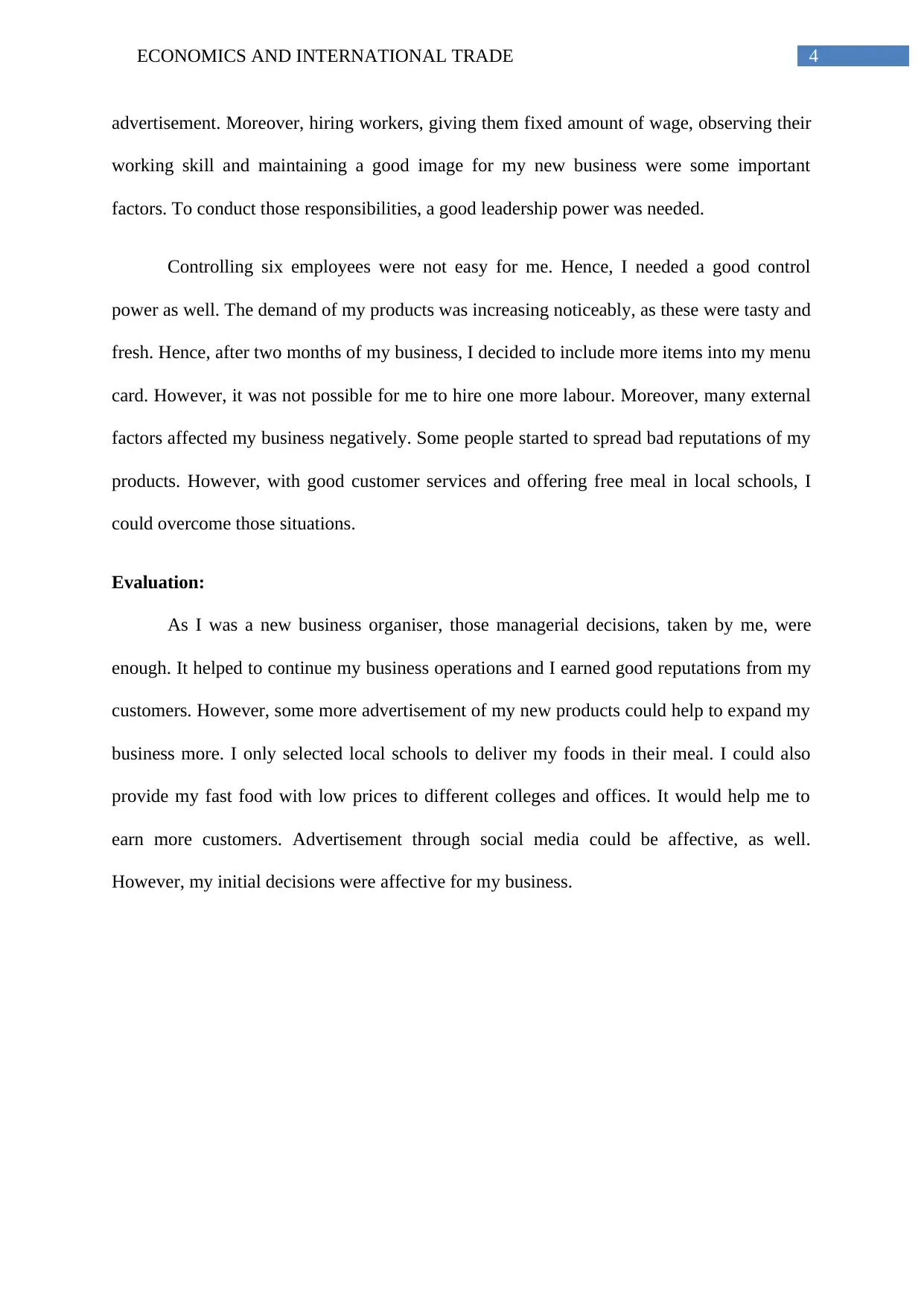
4ECONOMICS AND INTERNATIONAL TRADE
advertisement. Moreover, hiring workers, giving them fixed amount of wage, observing their
working skill and maintaining a good image for my new business were some important
factors. To conduct those responsibilities, a good leadership power was needed.
Controlling six employees were not easy for me. Hence, I needed a good control
power as well. The demand of my products was increasing noticeably, as these were tasty and
fresh. Hence, after two months of my business, I decided to include more items into my menu
card. However, it was not possible for me to hire one more labour. Moreover, many external
factors affected my business negatively. Some people started to spread bad reputations of my
products. However, with good customer services and offering free meal in local schools, I
could overcome those situations.
Evaluation:
As I was a new business organiser, those managerial decisions, taken by me, were
enough. It helped to continue my business operations and I earned good reputations from my
customers. However, some more advertisement of my new products could help to expand my
business more. I only selected local schools to deliver my foods in their meal. I could also
provide my fast food with low prices to different colleges and offices. It would help me to
earn more customers. Advertisement through social media could be affective, as well.
However, my initial decisions were affective for my business.
advertisement. Moreover, hiring workers, giving them fixed amount of wage, observing their
working skill and maintaining a good image for my new business were some important
factors. To conduct those responsibilities, a good leadership power was needed.
Controlling six employees were not easy for me. Hence, I needed a good control
power as well. The demand of my products was increasing noticeably, as these were tasty and
fresh. Hence, after two months of my business, I decided to include more items into my menu
card. However, it was not possible for me to hire one more labour. Moreover, many external
factors affected my business negatively. Some people started to spread bad reputations of my
products. However, with good customer services and offering free meal in local schools, I
could overcome those situations.
Evaluation:
As I was a new business organiser, those managerial decisions, taken by me, were
enough. It helped to continue my business operations and I earned good reputations from my
customers. However, some more advertisement of my new products could help to expand my
business more. I only selected local schools to deliver my foods in their meal. I could also
provide my fast food with low prices to different colleges and offices. It would help me to
earn more customers. Advertisement through social media could be affective, as well.
However, my initial decisions were affective for my business.
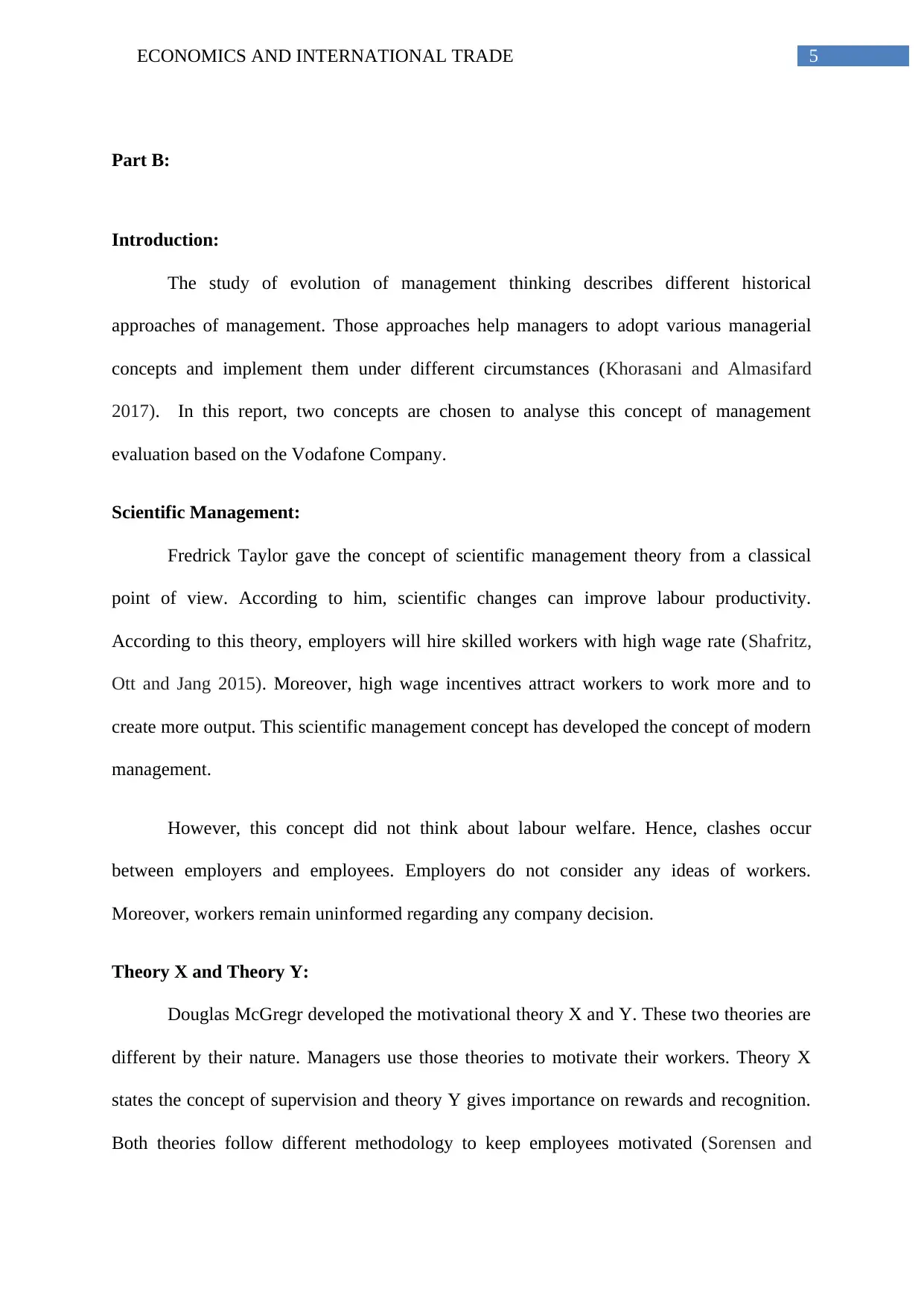
5ECONOMICS AND INTERNATIONAL TRADE
Part B:
Introduction:
The study of evolution of management thinking describes different historical
approaches of management. Those approaches help managers to adopt various managerial
concepts and implement them under different circumstances (Khorasani and Almasifard
2017). In this report, two concepts are chosen to analyse this concept of management
evaluation based on the Vodafone Company.
Scientific Management:
Fredrick Taylor gave the concept of scientific management theory from a classical
point of view. According to him, scientific changes can improve labour productivity.
According to this theory, employers will hire skilled workers with high wage rate (Shafritz,
Ott and Jang 2015). Moreover, high wage incentives attract workers to work more and to
create more output. This scientific management concept has developed the concept of modern
management.
However, this concept did not think about labour welfare. Hence, clashes occur
between employers and employees. Employers do not consider any ideas of workers.
Moreover, workers remain uninformed regarding any company decision.
Theory X and Theory Y:
Douglas McGregr developed the motivational theory X and Y. These two theories are
different by their nature. Managers use those theories to motivate their workers. Theory X
states the concept of supervision and theory Y gives importance on rewards and recognition.
Both theories follow different methodology to keep employees motivated (Sorensen and
Part B:
Introduction:
The study of evolution of management thinking describes different historical
approaches of management. Those approaches help managers to adopt various managerial
concepts and implement them under different circumstances (Khorasani and Almasifard
2017). In this report, two concepts are chosen to analyse this concept of management
evaluation based on the Vodafone Company.
Scientific Management:
Fredrick Taylor gave the concept of scientific management theory from a classical
point of view. According to him, scientific changes can improve labour productivity.
According to this theory, employers will hire skilled workers with high wage rate (Shafritz,
Ott and Jang 2015). Moreover, high wage incentives attract workers to work more and to
create more output. This scientific management concept has developed the concept of modern
management.
However, this concept did not think about labour welfare. Hence, clashes occur
between employers and employees. Employers do not consider any ideas of workers.
Moreover, workers remain uninformed regarding any company decision.
Theory X and Theory Y:
Douglas McGregr developed the motivational theory X and Y. These two theories are
different by their nature. Managers use those theories to motivate their workers. Theory X
states the concept of supervision and theory Y gives importance on rewards and recognition.
Both theories follow different methodology to keep employees motivated (Sorensen and
⊘ This is a preview!⊘
Do you want full access?
Subscribe today to unlock all pages.

Trusted by 1+ million students worldwide
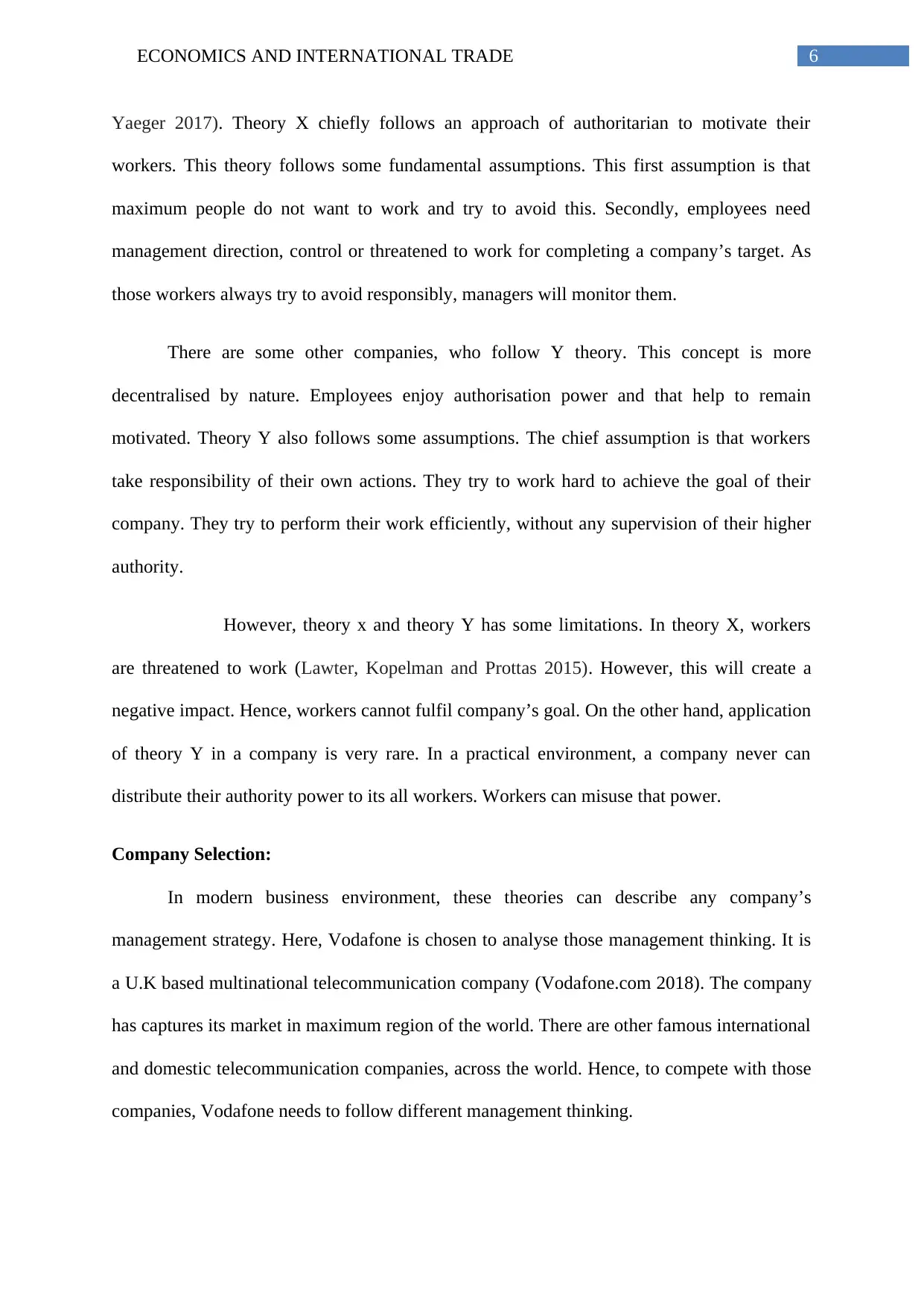
6ECONOMICS AND INTERNATIONAL TRADE
Yaeger 2017). Theory X chiefly follows an approach of authoritarian to motivate their
workers. This theory follows some fundamental assumptions. This first assumption is that
maximum people do not want to work and try to avoid this. Secondly, employees need
management direction, control or threatened to work for completing a company’s target. As
those workers always try to avoid responsibly, managers will monitor them.
There are some other companies, who follow Y theory. This concept is more
decentralised by nature. Employees enjoy authorisation power and that help to remain
motivated. Theory Y also follows some assumptions. The chief assumption is that workers
take responsibility of their own actions. They try to work hard to achieve the goal of their
company. They try to perform their work efficiently, without any supervision of their higher
authority.
However, theory x and theory Y has some limitations. In theory X, workers
are threatened to work (Lawter, Kopelman and Prottas 2015). However, this will create a
negative impact. Hence, workers cannot fulfil company’s goal. On the other hand, application
of theory Y in a company is very rare. In a practical environment, a company never can
distribute their authority power to its all workers. Workers can misuse that power.
Company Selection:
In modern business environment, these theories can describe any company’s
management strategy. Here, Vodafone is chosen to analyse those management thinking. It is
a U.K based multinational telecommunication company (Vodafone.com 2018). The company
has captures its market in maximum region of the world. There are other famous international
and domestic telecommunication companies, across the world. Hence, to compete with those
companies, Vodafone needs to follow different management thinking.
Yaeger 2017). Theory X chiefly follows an approach of authoritarian to motivate their
workers. This theory follows some fundamental assumptions. This first assumption is that
maximum people do not want to work and try to avoid this. Secondly, employees need
management direction, control or threatened to work for completing a company’s target. As
those workers always try to avoid responsibly, managers will monitor them.
There are some other companies, who follow Y theory. This concept is more
decentralised by nature. Employees enjoy authorisation power and that help to remain
motivated. Theory Y also follows some assumptions. The chief assumption is that workers
take responsibility of their own actions. They try to work hard to achieve the goal of their
company. They try to perform their work efficiently, without any supervision of their higher
authority.
However, theory x and theory Y has some limitations. In theory X, workers
are threatened to work (Lawter, Kopelman and Prottas 2015). However, this will create a
negative impact. Hence, workers cannot fulfil company’s goal. On the other hand, application
of theory Y in a company is very rare. In a practical environment, a company never can
distribute their authority power to its all workers. Workers can misuse that power.
Company Selection:
In modern business environment, these theories can describe any company’s
management strategy. Here, Vodafone is chosen to analyse those management thinking. It is
a U.K based multinational telecommunication company (Vodafone.com 2018). The company
has captures its market in maximum region of the world. There are other famous international
and domestic telecommunication companies, across the world. Hence, to compete with those
companies, Vodafone needs to follow different management thinking.
Paraphrase This Document
Need a fresh take? Get an instant paraphrase of this document with our AI Paraphraser
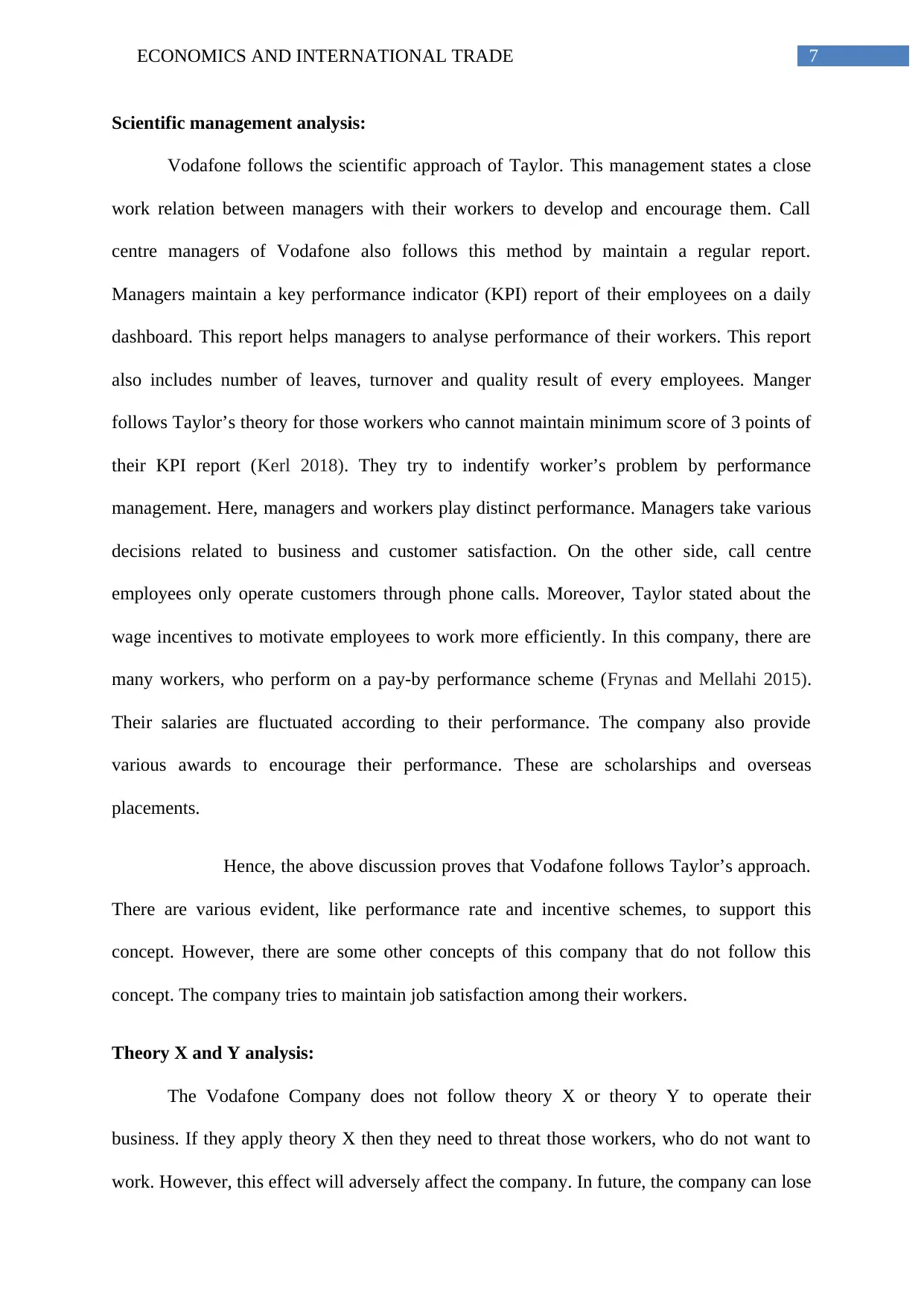
7ECONOMICS AND INTERNATIONAL TRADE
Scientific management analysis:
Vodafone follows the scientific approach of Taylor. This management states a close
work relation between managers with their workers to develop and encourage them. Call
centre managers of Vodafone also follows this method by maintain a regular report.
Managers maintain a key performance indicator (KPI) report of their employees on a daily
dashboard. This report helps managers to analyse performance of their workers. This report
also includes number of leaves, turnover and quality result of every employees. Manger
follows Taylor’s theory for those workers who cannot maintain minimum score of 3 points of
their KPI report (Kerl 2018). They try to indentify worker’s problem by performance
management. Here, managers and workers play distinct performance. Managers take various
decisions related to business and customer satisfaction. On the other side, call centre
employees only operate customers through phone calls. Moreover, Taylor stated about the
wage incentives to motivate employees to work more efficiently. In this company, there are
many workers, who perform on a pay-by performance scheme (Frynas and Mellahi 2015).
Their salaries are fluctuated according to their performance. The company also provide
various awards to encourage their performance. These are scholarships and overseas
placements.
Hence, the above discussion proves that Vodafone follows Taylor’s approach.
There are various evident, like performance rate and incentive schemes, to support this
concept. However, there are some other concepts of this company that do not follow this
concept. The company tries to maintain job satisfaction among their workers.
Theory X and Y analysis:
The Vodafone Company does not follow theory X or theory Y to operate their
business. If they apply theory X then they need to threat those workers, who do not want to
work. However, this effect will adversely affect the company. In future, the company can lose
Scientific management analysis:
Vodafone follows the scientific approach of Taylor. This management states a close
work relation between managers with their workers to develop and encourage them. Call
centre managers of Vodafone also follows this method by maintain a regular report.
Managers maintain a key performance indicator (KPI) report of their employees on a daily
dashboard. This report helps managers to analyse performance of their workers. This report
also includes number of leaves, turnover and quality result of every employees. Manger
follows Taylor’s theory for those workers who cannot maintain minimum score of 3 points of
their KPI report (Kerl 2018). They try to indentify worker’s problem by performance
management. Here, managers and workers play distinct performance. Managers take various
decisions related to business and customer satisfaction. On the other side, call centre
employees only operate customers through phone calls. Moreover, Taylor stated about the
wage incentives to motivate employees to work more efficiently. In this company, there are
many workers, who perform on a pay-by performance scheme (Frynas and Mellahi 2015).
Their salaries are fluctuated according to their performance. The company also provide
various awards to encourage their performance. These are scholarships and overseas
placements.
Hence, the above discussion proves that Vodafone follows Taylor’s approach.
There are various evident, like performance rate and incentive schemes, to support this
concept. However, there are some other concepts of this company that do not follow this
concept. The company tries to maintain job satisfaction among their workers.
Theory X and Y analysis:
The Vodafone Company does not follow theory X or theory Y to operate their
business. If they apply theory X then they need to threat those workers, who do not want to
work. However, this effect will adversely affect the company. In future, the company can lose
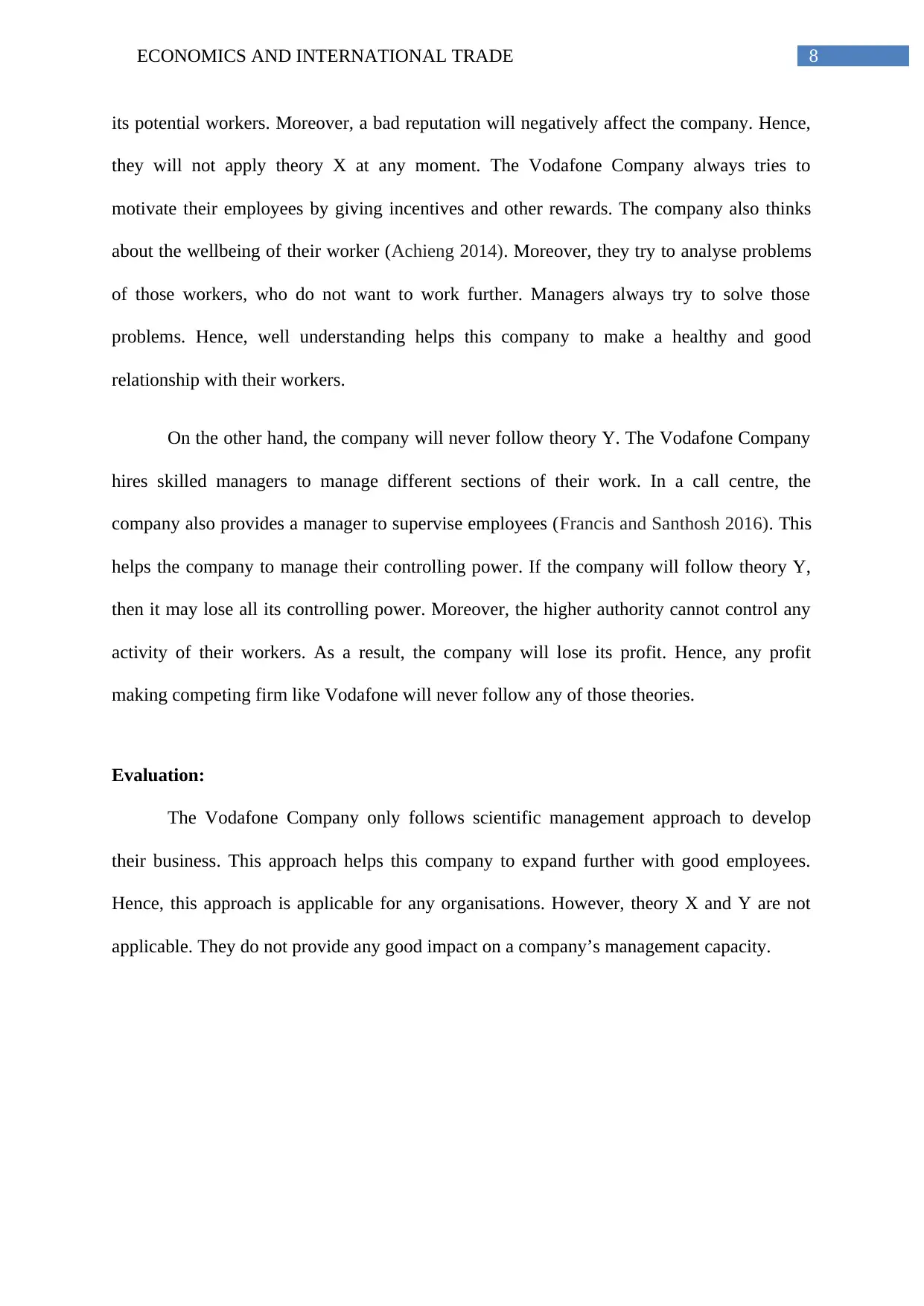
8ECONOMICS AND INTERNATIONAL TRADE
its potential workers. Moreover, a bad reputation will negatively affect the company. Hence,
they will not apply theory X at any moment. The Vodafone Company always tries to
motivate their employees by giving incentives and other rewards. The company also thinks
about the wellbeing of their worker (Achieng 2014). Moreover, they try to analyse problems
of those workers, who do not want to work further. Managers always try to solve those
problems. Hence, well understanding helps this company to make a healthy and good
relationship with their workers.
On the other hand, the company will never follow theory Y. The Vodafone Company
hires skilled managers to manage different sections of their work. In a call centre, the
company also provides a manager to supervise employees (Francis and Santhosh 2016). This
helps the company to manage their controlling power. If the company will follow theory Y,
then it may lose all its controlling power. Moreover, the higher authority cannot control any
activity of their workers. As a result, the company will lose its profit. Hence, any profit
making competing firm like Vodafone will never follow any of those theories.
Evaluation:
The Vodafone Company only follows scientific management approach to develop
their business. This approach helps this company to expand further with good employees.
Hence, this approach is applicable for any organisations. However, theory X and Y are not
applicable. They do not provide any good impact on a company’s management capacity.
its potential workers. Moreover, a bad reputation will negatively affect the company. Hence,
they will not apply theory X at any moment. The Vodafone Company always tries to
motivate their employees by giving incentives and other rewards. The company also thinks
about the wellbeing of their worker (Achieng 2014). Moreover, they try to analyse problems
of those workers, who do not want to work further. Managers always try to solve those
problems. Hence, well understanding helps this company to make a healthy and good
relationship with their workers.
On the other hand, the company will never follow theory Y. The Vodafone Company
hires skilled managers to manage different sections of their work. In a call centre, the
company also provides a manager to supervise employees (Francis and Santhosh 2016). This
helps the company to manage their controlling power. If the company will follow theory Y,
then it may lose all its controlling power. Moreover, the higher authority cannot control any
activity of their workers. As a result, the company will lose its profit. Hence, any profit
making competing firm like Vodafone will never follow any of those theories.
Evaluation:
The Vodafone Company only follows scientific management approach to develop
their business. This approach helps this company to expand further with good employees.
Hence, this approach is applicable for any organisations. However, theory X and Y are not
applicable. They do not provide any good impact on a company’s management capacity.
⊘ This is a preview!⊘
Do you want full access?
Subscribe today to unlock all pages.

Trusted by 1+ million students worldwide
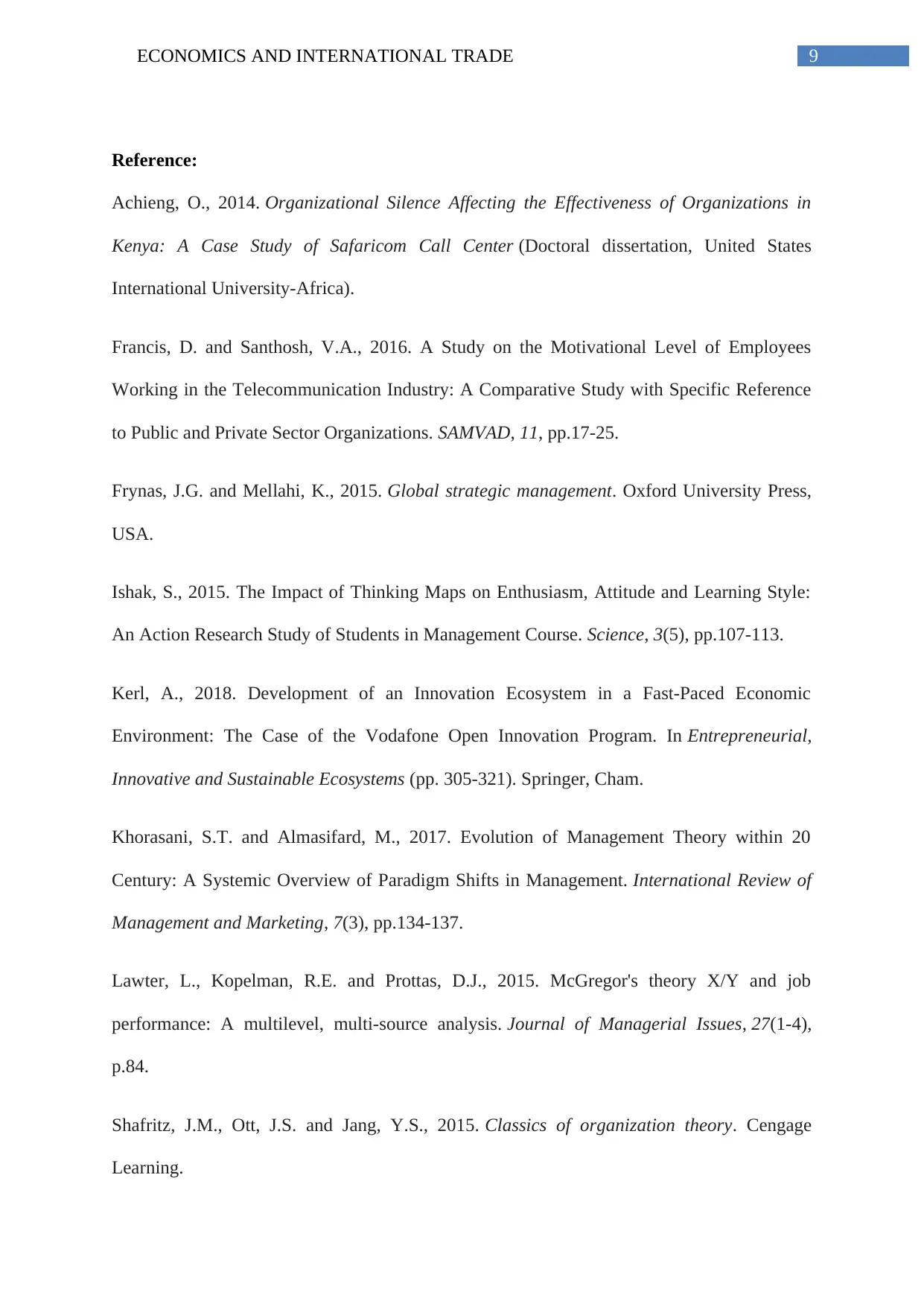
9ECONOMICS AND INTERNATIONAL TRADE
Reference:
Achieng, O., 2014. Organizational Silence Affecting the Effectiveness of Organizations in
Kenya: A Case Study of Safaricom Call Center (Doctoral dissertation, United States
International University-Africa).
Francis, D. and Santhosh, V.A., 2016. A Study on the Motivational Level of Employees
Working in the Telecommunication Industry: A Comparative Study with Specific Reference
to Public and Private Sector Organizations. SAMVAD, 11, pp.17-25.
Frynas, J.G. and Mellahi, K., 2015. Global strategic management. Oxford University Press,
USA.
Ishak, S., 2015. The Impact of Thinking Maps on Enthusiasm, Attitude and Learning Style:
An Action Research Study of Students in Management Course. Science, 3(5), pp.107-113.
Kerl, A., 2018. Development of an Innovation Ecosystem in a Fast-Paced Economic
Environment: The Case of the Vodafone Open Innovation Program. In Entrepreneurial,
Innovative and Sustainable Ecosystems (pp. 305-321). Springer, Cham.
Khorasani, S.T. and Almasifard, M., 2017. Evolution of Management Theory within 20
Century: A Systemic Overview of Paradigm Shifts in Management. International Review of
Management and Marketing, 7(3), pp.134-137.
Lawter, L., Kopelman, R.E. and Prottas, D.J., 2015. McGregor's theory X/Y and job
performance: A multilevel, multi-source analysis. Journal of Managerial Issues, 27(1-4),
p.84.
Shafritz, J.M., Ott, J.S. and Jang, Y.S., 2015. Classics of organization theory. Cengage
Learning.
Reference:
Achieng, O., 2014. Organizational Silence Affecting the Effectiveness of Organizations in
Kenya: A Case Study of Safaricom Call Center (Doctoral dissertation, United States
International University-Africa).
Francis, D. and Santhosh, V.A., 2016. A Study on the Motivational Level of Employees
Working in the Telecommunication Industry: A Comparative Study with Specific Reference
to Public and Private Sector Organizations. SAMVAD, 11, pp.17-25.
Frynas, J.G. and Mellahi, K., 2015. Global strategic management. Oxford University Press,
USA.
Ishak, S., 2015. The Impact of Thinking Maps on Enthusiasm, Attitude and Learning Style:
An Action Research Study of Students in Management Course. Science, 3(5), pp.107-113.
Kerl, A., 2018. Development of an Innovation Ecosystem in a Fast-Paced Economic
Environment: The Case of the Vodafone Open Innovation Program. In Entrepreneurial,
Innovative and Sustainable Ecosystems (pp. 305-321). Springer, Cham.
Khorasani, S.T. and Almasifard, M., 2017. Evolution of Management Theory within 20
Century: A Systemic Overview of Paradigm Shifts in Management. International Review of
Management and Marketing, 7(3), pp.134-137.
Lawter, L., Kopelman, R.E. and Prottas, D.J., 2015. McGregor's theory X/Y and job
performance: A multilevel, multi-source analysis. Journal of Managerial Issues, 27(1-4),
p.84.
Shafritz, J.M., Ott, J.S. and Jang, Y.S., 2015. Classics of organization theory. Cengage
Learning.
Paraphrase This Document
Need a fresh take? Get an instant paraphrase of this document with our AI Paraphraser
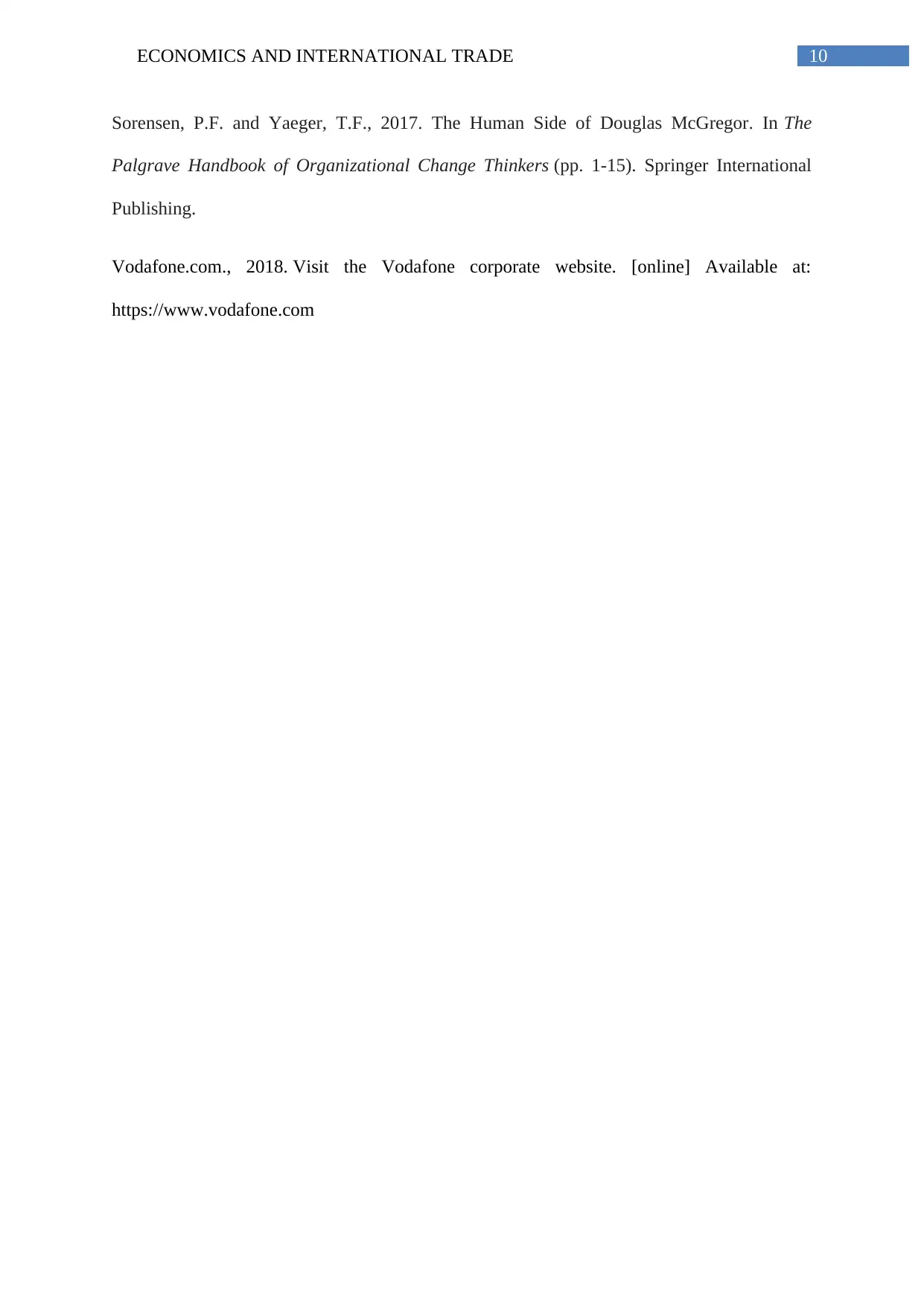
10ECONOMICS AND INTERNATIONAL TRADE
Sorensen, P.F. and Yaeger, T.F., 2017. The Human Side of Douglas McGregor. In The
Palgrave Handbook of Organizational Change Thinkers (pp. 1-15). Springer International
Publishing.
Vodafone.com., 2018. Visit the Vodafone corporate website. [online] Available at:
https://www.vodafone.com
Sorensen, P.F. and Yaeger, T.F., 2017. The Human Side of Douglas McGregor. In The
Palgrave Handbook of Organizational Change Thinkers (pp. 1-15). Springer International
Publishing.
Vodafone.com., 2018. Visit the Vodafone corporate website. [online] Available at:
https://www.vodafone.com
1 out of 11
Related Documents
Your All-in-One AI-Powered Toolkit for Academic Success.
+13062052269
info@desklib.com
Available 24*7 on WhatsApp / Email
![[object Object]](/_next/static/media/star-bottom.7253800d.svg)
Unlock your academic potential
Copyright © 2020–2026 A2Z Services. All Rights Reserved. Developed and managed by ZUCOL.




